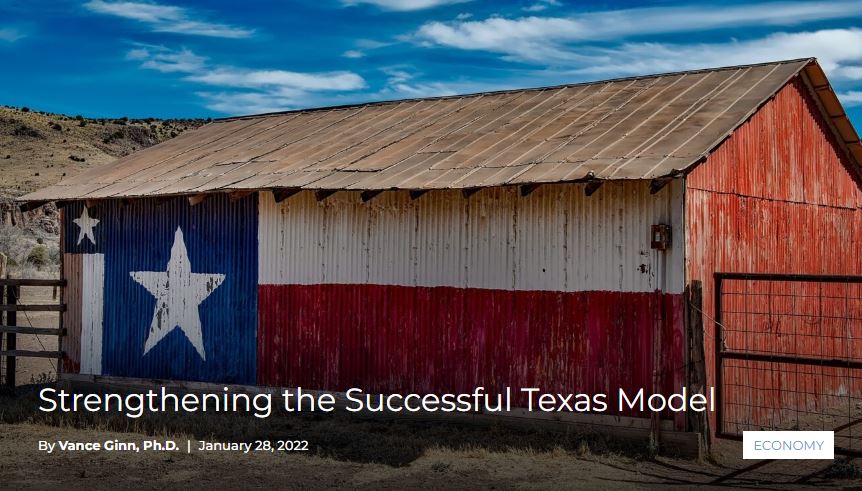|
It feels like there’s hope on the horizon. As Gov. Abbott said in his recent State of the State speech, “With each passing day of more vaccinations and increased immunity, normalcy is returning to Texas.” The Texas economy is recovering and at long last, some normal activity is returning. We’re not out of the woods yet, but we can at least see a clearing ahead.
Yet too many Texans could be left behind. “The situation in the Houston area is particularly desperate, with almost half of residents struggling to pay basic expenses in the week ending Dec. 7, according to a Census Bureau survey,” Pew reports. Lawmakers can help, but the help must be the right kind. History shows that our poorly designed welfare system traps too many people in poverty or near-poverty. Economists like me will tell you that people respond to incentives, and the welfare system disincentivizes self-sufficiency. So, the best response is to unleash opportunities for people to prosper. We can reverse those incentives and show our fellow Texans that they can achieve their American dream. How? Through what we’re calling the Opportunity Project that provides a path to dignity, self-sufficiency, and prosperity. Let’s start with more effective training for better jobs. We can tailor our state’s workforce development efforts more narrowly to the jobs that are out there and the skills that are needed. Texas is a prosperous state with many job opportunities, but a portion of the populace lacks the skills necessary to get and keep these jobs. But we know what helps. Welfare-to-work programs, with the vital participation of the private sector, can change lives. Generally speaking, such programs target disadvantaged populations, provide training in a marketable skill in addition to “soft-skills” instruction, and offer wraparound services (such as child care, transportation vouchers, housing assistance, etc.), job placement services, and follow-up services to help graduates stay on a path to success. One example is the earn-while-you-learn program established by the Texas Federation for Advanced Manufacturing Education (FAME) in San Antonio. The employers in the consortium offer a competitive wage that gives program participants the safety net they need to leave low-paying jobs or welfare. The payoff for employers is a steady stream of well-qualified workers. Next, let’s lower barriers to entrepreneurship by rolling back restrictive regulations like occupational licensing. Nationally, nearly 22 percent of jobs require an occupational license. That makes sense for doctors, but many other occupations are questionable at best—such as cosmetologists having to complete 10 times more days of training than EMTs. And it’s not just the silly licensing rules; many licensing schemes exclude those who have a criminal conviction. We believe in second chances; that should also apply to occupational licensing, especially when the license has no direct relationship with the long-ago crime. Finally, where we can, we must keep the existing welfare system from unintentionally trapping people in a life of helplessness. Welfare should be reprioritized to count as “successes” those who move off and stay off it rather than those enrolled. We can streamline and simplify the sign-up process and implement efficiency audits of programs to ensure those Texans who need help receive it, while clearly defining the pathways out of welfare dependency. Where the system creates a welfare benefits “cliff”—in which families lose benefits arbitrarily or too quickly when they re-enter the workforce—we should demand a smoothed approach that doesn’t disincentivize work. Of course, a strong and vibrant economy is key to making this work. Gov. Abbott made this point: “Texas has been ranked the number one state for business for 16 straight years. For the past eight years, we led the nation in economic development, and we have led America in exports for 18 straight years. The Texas model. It inspires entrepreneurs and innovators and attracts job creators from across the entire country.” Strengthening the Texas Model is the best way to uphold this, with lower taxes (and no personal income tax), fewer unnecessary regulations, and a commitment to limited government. This framework provides more economic freedom and greater opportunity for all Texans. The COVID-19 pandemic isn’t over, but recovery is on the way. Let’s work to assure every Texan can participate when the economy opens and thereafter. https://www.texaspolicy.com/opportunity-project-leaving-no-texan-behind/ Comments are closed.
|
Vance Ginn, Ph.D.
|


 RSS Feed
RSS Feed